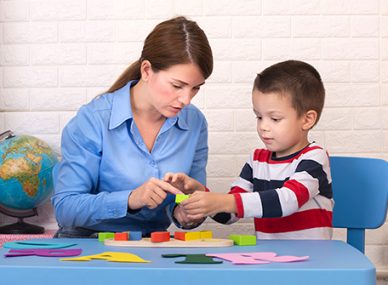Hello parents! How is your little kid doing? Do you see, your kid is having difficulties with day-to-day activities at home, school, or in the community? Is your child experiencing challenges that do not affect the majority of typically developing children? If so, relax! Getting concerned about the condition of your child is normal! But, it won’t solve the issue. In this case, you need to take your child to an occupational therapist.
If you have not heard of Occupational Therapy for children before, it’s fine! Let’s see what occupational therapy is!
Occupational therapy also termed OT is basically a branch of health care that helps people of all ages with physical, sensory, or cognitive problems. OT is something that can help your child regain independence in all areas of his/her life.
In other words, OT helps kids play, accelerate their school performance, and perform daily chores on their own. It also boosts their self-esteem and sense of accomplishment.
Occupational Therapy Helps Children With A Variety Of Factors, Such As:
- Improving fine motor skills and gross motor skills
- Helping children learn how to crawl and walk, write and read
- How to develop self-care skills, visual and perceptual skills, Hand-eye coordination, social skills and play skills, sensory processing ability
- etc.
- How to balance emotional regulation
- Helping them to learn how to balance and coordinate themselves
- and, much more
How To Know Your Child Needs Occupational Therapy? Or, What Are The Alarming Signs That May Indicate You Need To Visit An Occupational Therapist?
Missing out on Developmental Milestones
Developmental milestones are something that parents and caregivers can use to track their child’s developmental progress. This helps to give an idea about when parents should be expecting their children to reach specific milestones.
These milestones may include- crawling, walking, talking, or doing stuff on their own. Here’s an example. Our experts say that children learn how to feed themselves finger food when they reach 10 months and use a spoon by 18-24 months. If you see your child is showing signs of developmental delay, it’s a sound decision to visit the best pediatric occupational therapy clinic.
Poor Fine Motor Skills
Fine motor skills are those that help us perform a whole host of small motions required for a variety of everyday tasks. This skill is required to do stuff like turning the pages of a book, writing, drawing and painting, pasting and gluing, etc. Fine motor skill includes reaching, grasping and manipulating objects with your hands. There should be hand-eye coordination.
If you find your little one having problems performing such tasks, he/she may lack fine motor skills. The occupational therapist will use different types of tools and activities to improve upon these skills.
Poor Gross Motor Skills
Gross motor skills involve large body movements. This skill requires the use of larger parts of their body, such as their core, arms, legs, or other body parts. Using this skill, children learn sitting, crawling, jumping, running, throwing a ball, climbing, etc.
If you notice your child has poor gross motor skills or poor balance, you need to take your child to a renowned occupational therapist in Dubai.
Struggle With Processing Sensory Inputs
Children with sensory processing disorder may experience difficulties when processing sensory information. This leads to feelings of being overwhelmed, stressed, or anxious. This disorder affects the five basic senses: sight, touch, smell, hearing, and taste. For example, what may be perceived as mere background noise, such as traffic noises, can trigger extreme reactions in these children.
You may observe certain signs indicating that your child struggles with sensory input. These signs include recoiling at loud noises, disliking being touched, not responding when called, being bothered by clothing tags, etc.
If your child has a sensory processing disorder, you need to take him/her to an occupational therapist.
Fail to Develop Self-Care Habits
Self-care skills are required to perform essential daily tasks necessary for survival, such as feeding, dressing, and hygiene. In the case of children, self-care skills are age-appropriate tasks aligned with their developmental stage.
Self-care skills play a crucial role in cultivating a sense of independence in children. These skills are not only vital for their involvement in school but also for social outings and interactions. Consequently, children who struggle with self-care skills may face potential social consequences, including bullying and low self-esteem. That’s why parents must consider occupational therapy for kids who lack self-care skills.
Bottom Line
These are some of the prevalent signs that indicate your child may need occupational therapy. If you notice any developmental delays, don’t hesitate to reach out to our occupational therapists who have years of experience in this field. We offer tailored occupational therapy for toddlers as well as growing children.





